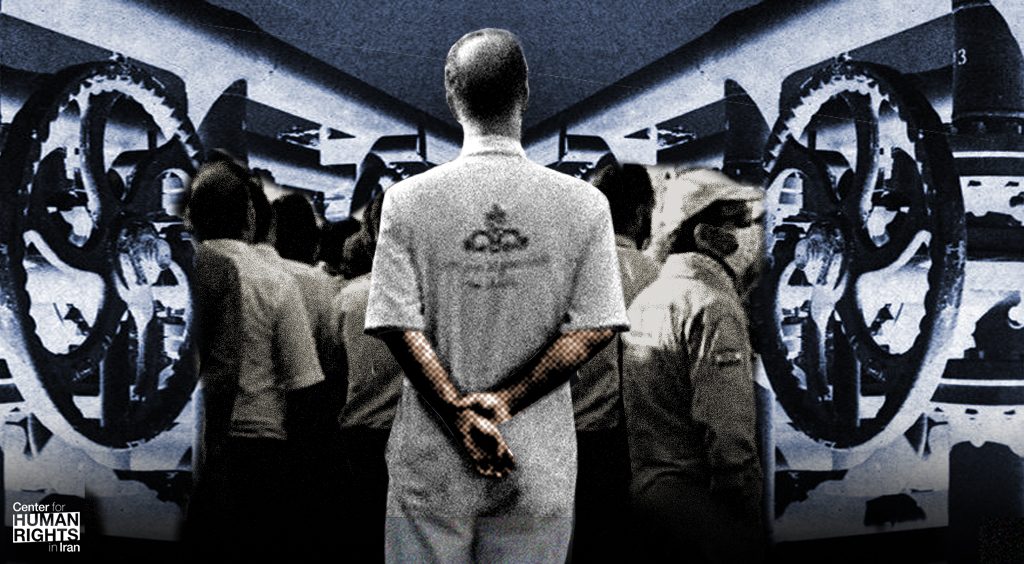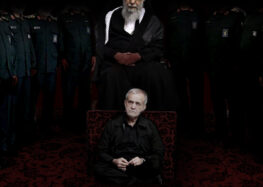Oil Industry Workers Go on National Strike in Iran
 Significant Shift from Protest Rallies to Work Stoppages
Significant Shift from Protest Rallies to Work Stoppages
For the past week workers at refineries, petrochemical plants and power stations in Iran have been on a national strike, demanding payment of back wages, pay increases to reflect inflation and improvements in health and safety at the workplace.
The depth and breadth of the strike has raised speculation that it has the potential to cripple the country, similar to the oil industry strikes of 1979. If the strikes continue, it could shut down vital parts of the economy. As a result, the security establishment is keeping a close eye on developments.
A statement released by the Council of Protesting and Striking Temporary Contract Oil Company Workers, said: “We…will continue our protest and strike to express against our present unbearable economic poor conditions, such as minimum unpaid wages, daily reduction of our household purchasing power and the empty promises and we demand a better increase and higher wages and salaries, adequate social security and better living conditions.”
“Protesters and strikers in other sectors have been waiting for oil workers to join their ranks and now it has happened,” said labor activist Sattar Rahmani in an interview with the Center for Human Rights in Iran (CHRI) on June 24, 2021. “It’s a turning point in the labor struggles of the recent decades.”
“The demands of oil and petrochemical workers are the same as other sectors but strikes in the oil industry are going to get more attention and therefore play an important role in spreading the protests to the entire labor community,” he added.
While the sheer number of strikes has made it difficult to suppress all of them by brute force, the striking workers are being confronted by other means of repression, such as expulsion and intimidation.
Moreover, the election of the ultra-conservative Ebrahim Raisi as president has dashed hopes for a rapid resolution and increased the possibility that the protests will spread to other sectors.
Worker Demands: Fair and Paid Wages, Insurance, Health and Safety Measures
The oil and petrochemical workers’ primary demand is higher pay as the country experiences historic inflation rates. For the year ending June 21, 2021, prices of goods and services jumped 43 percent, the highest annual rate in 26 years, according to figures released by the Statistical Center of Iran.
Workers are also unhappy about conditions at the workplace, especially in the field, which lack health and safety measures, despite Iran’s high COVID-19 infection rate. Seasonal contract workers, who usually work 24 days in a month, are also seeking to reduce it to 20 days.
The problems are largely due to projects being increasingly carried out by private companies who hire workers on a temporary basis with lower pay, creating a disparity with official workers and employees in the oil industry who receive higher pay and benefits.
Hopelessness in the face of the severe and sustained economic strains has led to an increase in the number of suicides committed by workers.
“After years of working for this company, the managers are asking the workers to sign a six-month contract on a blank piece of paper,” said an unnamed worker at the Hoveizeh oil field in southwest Iran, where one of his colleagues died of suicide in June 2020 after he was unable to collect his back pay.
Companies’ refusal to pay back wages has been a chronic problem Iranian workers face, leaving many families economically desperate and with little effective recourse or remedy. And the use of temporary and/or blank contracts has significantly increased over the last decade to encompass the majority of Iranian workers; under such contracts workers receive little if any of the insurance and benefits that are required under Iranian law.
On June 21, 2021, strikes began at refineries and quickly spread to many petrochemical plants and a number of power stations. Many employees stopped work and left their posts. The strikes are a significant tactical shift compared to protest rallies of the past which usually did not include work stoppages.
The Islamic Republic of Iran is dependent on revenues generated by the export of crude oil and petrochemical products. A prolonged strike by workers could have a serious impact on the country’s finances, on top of tight sanctions imposed by the US.
The Government’s Response: Firing, Intimidation and Hiring Restrictions
The security establishment is trying to undermine the protests with various measures, from firing labor activists, to imposing more stringent hiring practices to keep out “troublemakers” and bringing discord among workers by pitting parallel state-controlled labor organizations against independent unions.
One June 23, 2021, the Free Workers Union of Iran reported that Tehran refinery officials had reacted to a strike at one of its units by firing 700 protesting workers. The refinery’s public relations official denied the layoffs as “completely false.”
“Ebrahim Raisi, [with his history of repression] as a member of the Death Committee [which ordered the extrajudicial executions of thousands of political prisoners in 1988], is going to see the labor protests as a national security threat and the state will resort to more repressive measures to confront the labor protests and strikes,” Rahmani told CHRI.
“We’re going to witness a new front shaping against labor protests. If the workers don’t unite now, they will lose a historical opportunity and face a government and judiciary that’s ready to crack down and crush them with brutality,” he continued.
The growing strikes in the oil industry prompted Parliament’s Energy Committee to hold an emergency meeting with Oil Minister Bijan Namdar Zangeneh and other officials on June 24 to discuss the crisis.
“Given the rightful concerns of our dear workers who are struggling in the frontline of the economic war with the enemy, the heads of all three branches of state, our committee and other agencies are looking into the matter to find a solution,” said the chairman of the Parliament’s Energy Committee Fereydoun Hassanvand.
“The Energy Committee is recommending that the three branches of state should coordinate and issue the necessary orders and permits,” he added.
The Authorities May Resort to Violence if Strikes Continue
The longer the strikes go on, the more likely it is that the state may resort to violence in order to squash the strikes. At the same time, however, government officials may have to give in to some of the workers’ demands.
Protests by relatively well-paid official oil industry personnel have been rare. However, in the past year more of them have joined the protests after a ceiling was imposed on their salaries, reducing their take-home pay. Their participation in the strikes will be far more paralyzing than seasonal workers who currently make up the majority of the strikers.
“The latest strikes have raised optimism that all working-class protesters, including teachers, retirees, farmers, nurses and even students, will close ranks and shape a general labor strike in the country,” labor activist Rahmani told CHRI.
He continued, “Delayed salaries, security measures at the workplace, problems with health insurance, layoffs and poor safety conditions are some of the issues facing all workers and that means it is the best time for labor groups to unite and bring solidarity among all protesters.
“We must not allow these unprecedented and widespread protests to erode with the passage of time. It is necessary for all sectors of society that oppose the status quo, including the Writers Association of Iran and other activists, to support and join these strikes.”
The full statement by the workers follows here:
“The proclamation of the temporary hiring contract workers of the oil and gas refineries, petrochemical projects and power-plants:
To continue and express our core economic demands, we shall enter into a nationwide strike, along with other workers across the country.
We, the workers of the temporary hiring contract, from the oil and gas refineries, petrochemical projects and power-plants, will continue our protest and strike to express against our present unbearable economic poor conditions, such as minimum unpaid wages, daily reduction of our household purchasing power and the empty promises and we demand a better increase and higher wages and salaries, adequate social security and better living conditions. With the false pretenses and bleak promises, as we have already stated, we will continue our struggle to press our economic demands for a wide-spread and nation-wide strike, with our fellow workers of different public and private sectors – in front of the places of work.
We, strongly demand our worker’s rights and in accordance to the previous demand, as stated in the 29 Khordad (3rd month in the Persian calendar), with our technical and project colleagues from the Farab Bid Khoon power-plants will enter and continue to support our demands for higher wages, better living conditions, twenty days of work and ten days of rest which is known as 20-10 Plan, that the workers have already left their homes and they strongly declare that unless the responsible authorities do not meet their demands, we shall not return to our power-plants and other petro-chemical projects.
The worker’s genuine protests and strikes are regarded as an alert to the responsible authorities in charge and this will continue and shall remain for a one week period and if our demands have not been met by such authorities, we will combine and participate with other cliques who are already on strike. This week, our strike and gathering with other workers from different power-plants and generations will commence in front of our places of work and we will serve to raise our voices to the public and private sectors in an attempt to declare our legitimate demands.
Our genuine and core demands and rights are as follows:
- No wages of any worker in the oil company should be less than 12 Million Tomans [Iranian currency] and immediately there must be an increase of wages in accordance to the present living conditions met with daily increases of household commodities and their purchasing power. In the same manner, the wages of other workers in various sectors should be increased with the agreement of their choosing representatives.
- The worker’s wages and salaries must be paid on time every month and any delay in payment is regarded as crime and stealing.
- We, strongly object to the casual and temporary hiring workers contract and vehemently demand to the end of temporary contract, hands off the contractors in interfering to the working agreement, reduced working hours and all workers should have their job securities in tact with their permanent worker agreement and no worker must be fired from his or her job.
- We, demand the immediate abolition of slavery workers laws and regulations which are visibly and vividly seen and practiced at the certain and specific poor economic areas that are very much an obstacle between our colleagues from various working class sectors in public and private at the national and state level in the country and on the bases of such unfair and unjust workers laws and regulations and as a result of such regulations workers are experiencing a tremendous poor working conditions and we demand the hands off and stop interfering of those greediest contractors and employers from both sectors in clear violations and abuses of our living economic conditions and we strongly ask for the implementations of job safety and security classification.
- We demand for the safety and security of our working environment. Our working environment is like a bomb explosion waiting to happen – there are a number of hazards involved including: falling from high levels, air and noise pollution, and chemical inhalation. Indeed, these working conditions are highly unsuitable and far below safe working standards. There are poor hygiene and safety regulations in working places, lack of job security and unbearable difficult conditions. We become daily victims to these destructive hazards and thus, have our mental and physical health impacted. The lack of ventilation and air quality within our working environment induces high pressure and stress which affects the way we work.
- The oil companies and other petrochemical projects and power plants have enough assets and capital; they must make relevant and appropriate changes to the already poor working conditions. This includes public transportation, on site clinics, toiletries and other working facilities. We the workers of the oil company are fed up with our poor working conditions that we have been made to endure and it is these conditions that prompt the need for swift rectification. We demand and have the rights to better working and living conditions.
- Ultimately, we support our workers from oil companies and other petro-chemical and power-plants colleagues in their demands for such fair working rights and if such demands are not met by the involved and responsible authorities from state and national level, we will commence and continue our protest and strike in full-swing, on the 9th of Tir (4th month in the Persian calendar).
- Our legitimate demands are the same demands of the oil company’s workers including the permanent workers. In addition, these colleagues on the bases of their minor pay increase in the current Year of 1400, (Iranian Calendar), as a matter of fact, it is a pure violation of their already unbearable poor living conditions. Huge taxable pressure on their salaries and the denial of the article ten and omission of various items on their already underpaid wages and salaries, have resulted in such core demands for continuous protest and strike.
Council of Protest and Striking Temporary Contract Oil Company Workers
30th Khordad 1400
20, June 2021″






